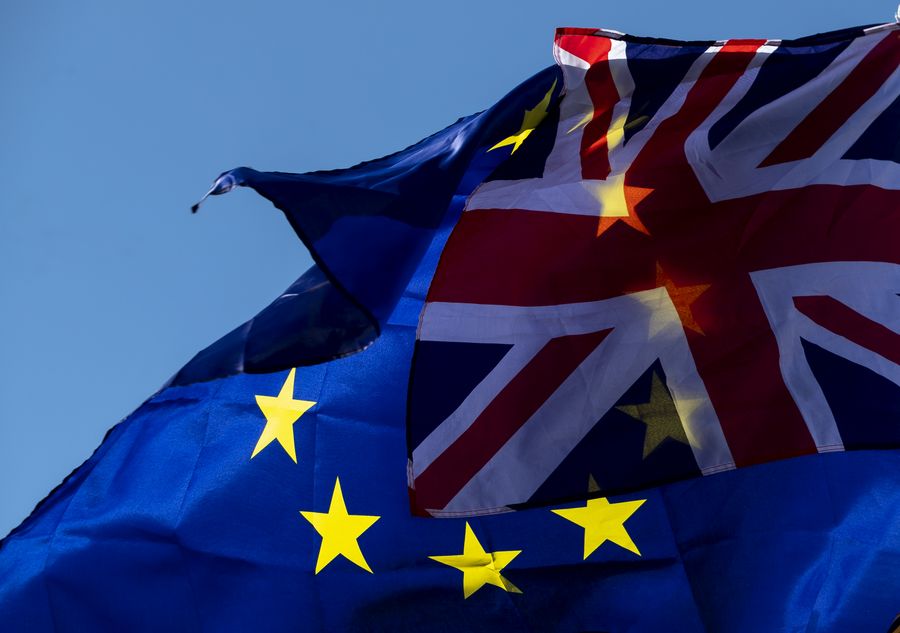
A protester with his face painted in the colors of an EU flag prepares to attend the "Together for the Final Say" event at the Parliament Square in London, Britain, on Oct. 19, 2019. (Photo by Stephen Chung/Xinhua)
Brexit stands as the most defining issue for the national election, the fourth in five years, despite that health, crime and immigration are also important concerns for the country.
Boris Johnson, the prime minister and leader of the Conservative Party whose campaign slogan is "Get Brexit Done", has pledged to deliver Brexit by January "at the absolute latest" if his party wins the election.
Political experts have warned that if all parties are denied an overall majority in the election, a hung parliament would create an irresistible demand for a second Brexit referendum to break the impasse, further extending the uncertainties Britain is facing.
by Xinhua writer Gui Tao
DUMFRIES, Britain, Nov. 21 (Xinhua) -- Campaign swings and possible massive tactical voting are expected to further complicate the upcoming Brexit-dominated British general election, making it one that is hardest to predict in recent decades.
Electoral candidates and voters in constituencies including Bishop Auckland, Derby North and Dumfries and Gallowy have told Xinhua that the Dec. 12 election will be very capricious. Reasons for the uncertainty range from the fluid allegiance of the voters and the tricky timing to the split vote and the strategic voting by the Remain voters.
DE-FACTO SECOND REFERENDUM
Brexit stands as the most defining issue for the national election, the fourth in five years, despite that health, crime and immigration are also important concerns for the country.
Statistics show that nearly 40 percent of the those surveyed by the global data company YouGov believe that "Britain leaving the European Union" would be the most important issue in determining how they will vote.
"This is the Brexit election," Ray Georgeson, candidate for Liberal Democrats in the Bishop Auckland constituency, told Xinhua. "Even though all other issues of proper concern will be debated, such as health, education and the climate emergency, until Brexit is dealt with very little of this will see any real progress."
Derby North Brexit Party candidate Alan Graves told Xinhua: "Until we get a true Brexit, this country cannot move forward and focus on other important issues such as public services."
Boris Johnson, the prime minister and leader of the Conservative Party whose campaign slogan is "Get Brexit Done", has pledged to deliver Brexit by January "at the absolute latest" if his party wins the election.
But for the Conservative Party that is holding a 10-odd-point lead over Labour weeks in the run-up to the election, the poll is far from a sure thing.
Political experts have warned that if all parties are denied an overall majority in the election, a hung parliament would create an irresistible demand for a second Brexit referendum to break the impasse, further extending the uncertainties Britain is facing.

The European Union flag and the Union Jack flag are seen outside the Houses of Parliament in London, Britain. (Xinhua/Han Yan)
FLUID POLITICS, SPLIT VOTE
British politics is more fluid than ever and many claim that even the 2017 election results carry limited bearing for what may happen now.
Georgeson said that public opinion over the past two years had shifted back in favor of Remain with the Liberal Democrats beating Labour and Conservatives in the European elections just a few months ago.
"This fluid public opinion, mixed with the British electoral system makes the election harder to predict than many might think," he said, adding that the inclusion of a Brexit party candidate in Bishop Auckland makes the seat a four-way marginal.
A Bishop Auckland town resident who gave his name as James said he will switch from Labour to the Liberal Democratic Party which "has a much clearer stance on Brexit."
Dumfries and Galloway, the southern Scottish constituency traditionally held by Conservatives, is also witnessing a changing electoral mood.
John Black, a shopkeeper who used to vote for the Conservatives, said he is considering voting for the Scottish National Party (SNP) this year.
A recent Populus survey has shown that 40 percent of the British people questioned said they would switch their vote from how they voted in the last general election in 2017.
Although the recently formed Brexit Party has pledged not to contest the 317 seats won by the Conservatives in 2017, many believe it will still split the Leave votes, thus threatening the Conservatives' chance in winning the traditionally Labour-held constituencies such as Bishop Auckland.

People react to the latest result of the amendment during the "Together for the Final Say" event at the Parliament Square outside the Houses of Parliament in London, Britain, Oct. 19, 2019. (Xinhua/Han Yan)
TACTICAL VOTING
Ahead of the election which is described by media as the "most important one for Britain since the second World War," there have been calls for massive tactical voting among the Remainers to prevent a Tory majority.
The anti-Brexit campaign Best for Britain suggests that if no tactical voting occurs, the Conservatives will win 364 seats; while if Remain voters vote strategically, that will change the political make-up in the Commons.
"If 40 percent of pro-Remain voters use their vote tactically, the Conservatives would win 277 seats" and lose its majority in the 650-seat parliament, it said.
The campaign has called on voters to choose the Labour Party in the Bishop Auckland constituency. The prediction is that without a tactical vote the Conservative Party is projected to win the seat by over five percentage points.
Brexit Party candidate Nick Brown in the constituency which has been regarded as a barometer for the rest of the northeast England, told Xinhua that he does not expect people to vote for their first choice in this "very hard to predict" election, the first December poll in nearly 100 years.
"I am also expecting a low turnout, blamed firstly because election day is happening at this time of the year, and secondly people's disillusion with the Brexit referendum result which has not been implemented," he added.
In Scotland, tactical votes are also urged to deprive the SNP of gains that would be regarded as mandate for a second independence referendum.
"If you are opposed to the second Scottish independence referendum, you will be tempted to vote tactically," Ted Thompson, Labour candidate in Dumfries and Gallowy, told Xinhua. "But most people do not make up their minds until the last day of the election." ■



